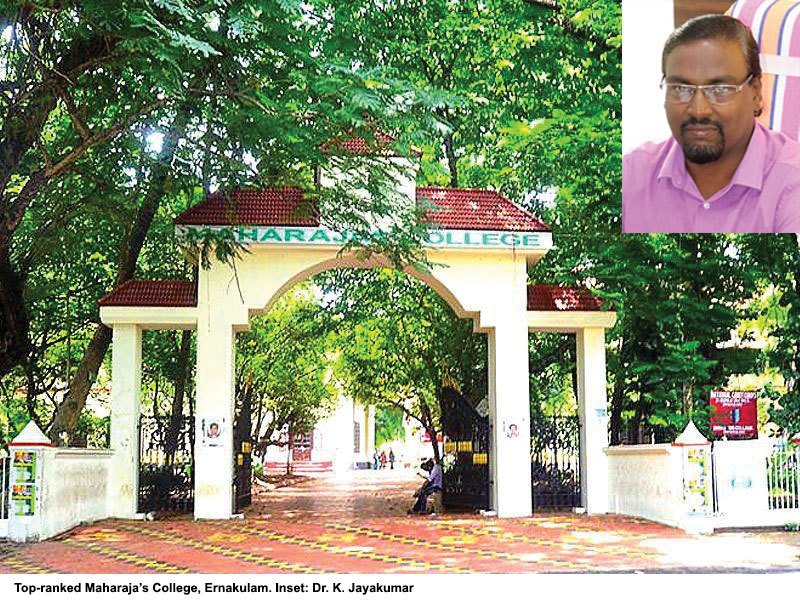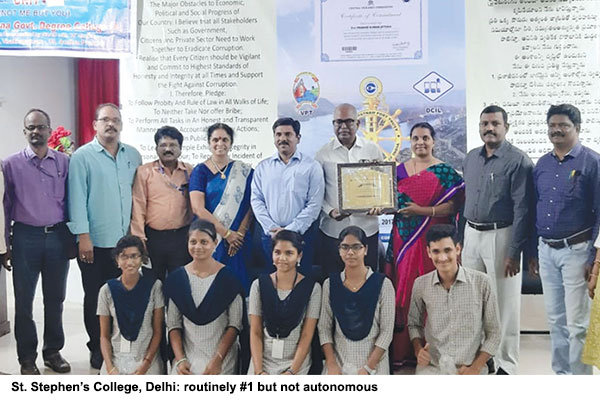It’s important to note that among (state) government promoted colleges countrywide, autonomous institutions enjoy special standing and privilege by virtue of their UGC conferred autonomous status.

Since 2018 when EducationWorld introduced its inaugural EW India Arts, Science & Commerce (ASC) Colleges Rankings, we focused on rating and ranking private colleges. However this year, on the advice of members of our Board of Advisors and eminent academics, we have divided the broad category of ASC colleges into three sub-categories: private autonomous, government autonomous (as classified by the University Grants Commission) and Top 100 non-autonomous colleges.
Until March 31, 2018, the Delhi-based UGC has awarded 708 colleges countrywide autonomous status i.e, academic autonomy. While over 38,000 non-autonomous colleges are tied to the apron strings of their affiliating universities, autonomous colleges are permitted to review existing courses/programmes and restructure, redesign and prescribe their own courses/programmes of study and syllabi; introduce new courses/programmes; evolve independent performance evaluation systems, conduct examinations and notify results. They are also allowed to issue mark sheets, migration and other certificates subject to degrees being awarded by parent university with the name of the college permitted to be inscribed on the degree certificate.
Unsurprisingly, UGC has set stringent conditions precedent for awarding colleges much-prized autonomous status. Applicant colleges must be of more than ten years vintage and “accredited by either NAAC (National Assessment and Accreditation Council) with minimum ‘A’ Grade or by NBA (National Board of Accreditation of the All India Council for Technical Education) for at least three programme(s) or be awarded autonomy by a corresponding accreditation grade/score from a UGC empanelled accreditation agency”. Of the 747 colleges conferred autonomous status by UGC, 643 are privately promoted and 104 in the (state) government sector.
To compile the 2020-21 EW league tables of India’s best private and government autonomous (as well as Top 100 non-autonomous) colleges, the well-known Delhi-based Centre for Forecasting & Research Pvt. Ltd (C fore) interviewed 4,813 sample respondents comprising 1,946 college/ university faculty and 2,467 final year college students and persuaded them to rate India’s sufficiently well-known colleges on five parameters of tertiary education excellence, viz, competence of faculty, faculty welfare and development, curriculum and pedagogy, industry placement record, infrastructure and quality of leadership/ governance. Low-profile institutions rated by less than 25 respondents are not ranked.
Though UGC’s criteria for grant of autonomy are uniformly applicable to all applicant institutions, it’s widely acknowledged that private autonomous colleges are several notches above government autonomous colleges, promoted and managed by cash-strapped state governments which nevertheless set tuition fees very low. The perceptual difference between private and government autonomous colleges is evident from the huge gap in the total scores awarded by this year’s sample respondents to top-ranked colleges in the two categories.
While St. Xavier’s College, Mumbai is ranked India’s #1 private autonomous college with a total score of 630, the top-ranked government autonomous college — Maharaja’s College, Ernakulam — has an aggregate score of 539, a difference of almost 100 points. Therefore, to avoid apples and oranges comparisons, privately pro moted and government autonomous colleges have been ranked separately in the EW India Higher Education Rankings 2020-21.
Yet it’s important to note that among (state) government-promoted colleges countrywide (the Central government has never promoted colleges, only 49 universities), government autonomous colleges enjoy special standing and privilege by virtue of their autonomous status for which a minimum ‘A’ Grade rating of the Bangalore-based National Assessment & Accreditation Council (NAAC) is a condition precedent. Despite this hallmark of academic achievement, state government autonomous colleges rarely figure in the league tables of media publications such as India Today, Outlook, Economic Times etc. Therefore, your editors have accorded them special recognition and ranked the sufficiently well-known 65 among them inter se.
In the inaugural 2020-21 EW government autonomous colleges national league table, Maharaja’s College, Ernakulam, Kochi (Kerala) is ranked India’s #1 with top scores under the parameters of faculty competence and curriculum and pedagogy. Sarojini Naidu Government Girls PG College, Bhopal is ranked #2 followed by Government (Model Autonomous) Holkar Science College, Indore at #3. Government Science College, Bangalore #4 and the Dr. V.S. Krishna Government Degree College, Vishakapatnam completes the Top 5.
“We are grateful to your survey respondents for this honour. Once an elitist institution, over the years Maharaja’s College has metamorphosed into an inclusive institution admitting students from all sections of society, especially the economically underprivileged, but without diluting our curriculum and academic standards. We are the only government college in Kerala granted autonomous status by UGC which has also designated us as a College with Potential for Excellence. After the grant of autonomy in 2014, we have improved our admission process, curriculum, pedagogy and examination system. As an autonomous college we also intend to introduce several new study programmes in artificial intelligence, molecular biology, cultural studies, etc. Also an advanced instrumentation facility and research centre will become operational in 2020-21,” says Dr. K. Jayakumar, principal of Maharaja’s College.
Founded in 1845 and sited on a lush green 25-acre campus in downtown Kochi in India’s most literate state, Maharaja’s College hosts 17 academic departments offering undergraduate, postgraduate and PhD programmes to 2,522 students mentored by 183 faculty (tuition fees: Rs.1,800-2,490 per year).
Your editors’ unprecedented initiative to evaluate and rank government autonomous colleges inter se rather than against all ASC colleges has also enthused Dr. Ch. Lalitha, coordinator, IQAC (Internal Quality Assurance Cell) of the Dr. V.S. Krishna Government Degree College, Vishakapatnam (DVSKGDC, estb.1968). “We are delighted to learn that DVSKGDC is ranked among the country’s Top 5 government autonomous colleges and #1 in Andhra Pradesh by your sample respondents. This college was granted autonomous status by UGC in 2011. Since then we have been working hard to design new study programmes, and upgrade curriculums and pedagogies. Although there are many private colleges in Vishakapatnam, we often receive 50 applications for every seat in some courses such as physics, computer science and maths. Last year, over 400 of our students were campus recruited by companies such as TCS, Mahindra Tech and Aurobindo Laboratories. As an autonomous institution we are constantly revising our syllabuses and curriculums and introducing new study programmes to make our graduates jobs ready. This year we propose to introduce our BMS in maritime logistics degree programme,” says Dr. Lalitha, also assistant professor of microbiology at DVSKGDC, which has an enrolment of 2,200 students mentored by 88 faculty.

A highlight of the EW India Government Autonomous Colleges Rankings 2020-21 is the surprising dominance of the national league table by colleges promoted by the Madhya Pradesh government. This Hindi heartland state has 50 of its autonomous colleges ranked in the 65-strong national league table with five institutions ranked among the Top 10. (see p.56)
Also read: India’s top-ranked government universities























